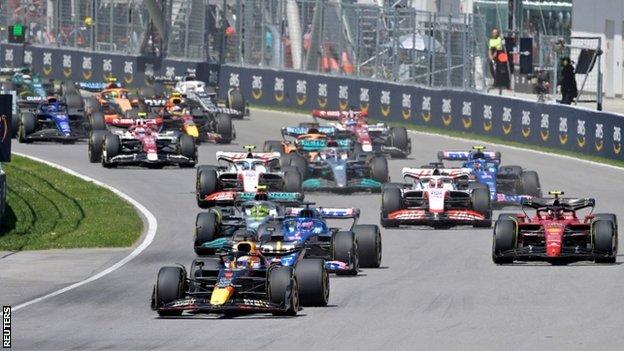



Reigning champion Max Verstappen extended his lead in this year's standings as he won the Canadian Grand Prix earlier this month
Synthetic fuels are manufactured by an industrial process and emit in their burning only the carbon that was taken out of the atmosphere to make them.
The fuel can be used in standard internal combustion engines and could help the car industry to decarbonise.
In F1, it will be used in new-generation hybrid engines from 2026.
These will increase the proportion of power produced by the hybrid part of the engine compared to the already super-efficient motors used since 2014.
F1 re-emphasised its commitment to fully sustainable fuels in a statement on Monday detailing its progress towards its net-zero goals.
The statement did not specify that the fuel it was developing was synthetic - as opposed to derived from bio-mass - but a source within F1 confirmed to BBC Sport that was the case.
The statement said the synthetic fuel was already in production with support from governing body, the FIA, and F1's fuel partner and engine manufacturers.
It has been designed as a 'drop-in' fuel - in other words, it can be used in place of standard fossil fuels in any internal combustion engine - to help accelerate its adoption and reduce costs for use in existing road cars.
Synthetic fuels are only fully net-zero if the energy used to create them is carbon-free. However, the source said: "The aim is to be zero-emission in the life-cycle of the fuel."
The hope is that these fuels can be used extensively around the world to reduce carbon emissions while there remain millions of internal combustion-engined vehicles on the roads despite many countries moving towards electrification.
Although many Western countries are to ban the sale of new internal combustion-engined cars at some point between 2030 and 2040, electric vehicles are still expected to make up less than one-third of those on the road by 2040.
In 2020, electric or hybrid vehicles made up only 1% of cars around the world.
F1 says it has made a series of other steps to move towards its net-zero goal, such as:
-- Courtesy of BBC Sport